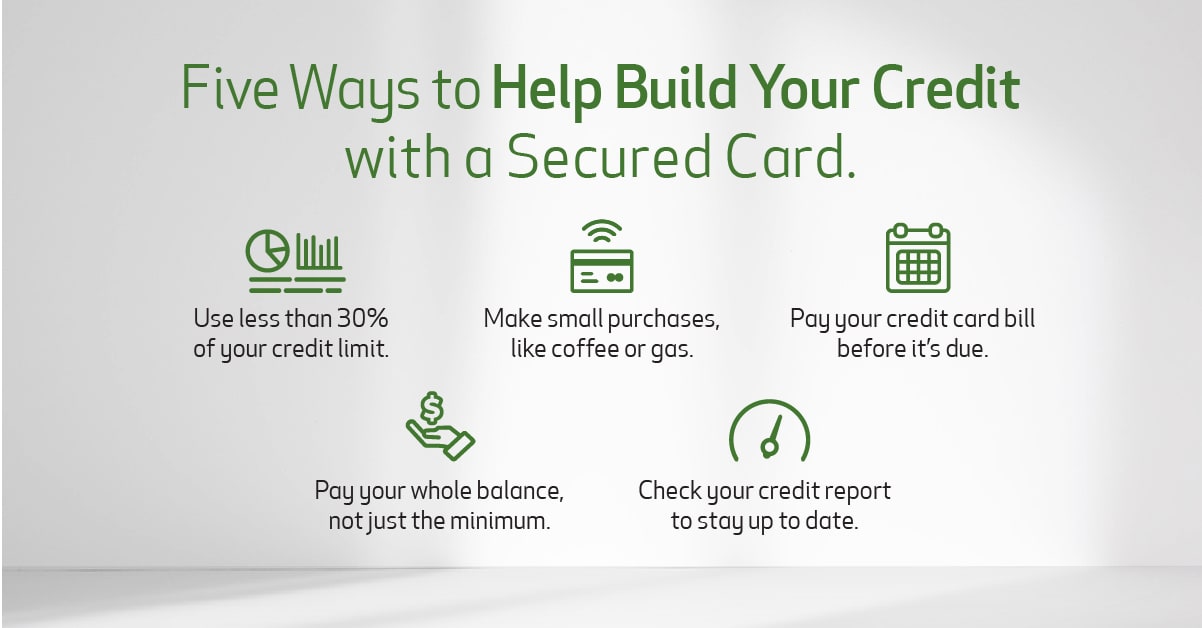Do secured credit cards help build credit?
When used responsibly, secured credit cards can help you build credit. Learn tips for establishing or rebuilding credit with a secured card and understand how long it may take to improve your credit score.

Go to where you need:
Key Takeaways:
- Secured credit cards require a one-time refundable security deposit to ensure you’ll pay your bills when they’re due. These credit cards often have lower credit limits and higher interest rates.
- Secured credit cards could help improve your credit score when used correctly and when credit card issuers report your secured credit card activity to the three main credit bureaus (Experian, Equifax, and TransUnion).
- No matter your starting point, a positive credit score doesn’t happen overnight. If you don’t have a credit score, it could take at least six months to receive your first credit score and if you’re rebuilding your credit, the amount of time it takes depends on your financial situation and your goals.
You may have heard of secured credit cards, but what are they, and do they help build credit? In short, yes, secured credit cards can help build your credit over time when used responsibly, and can be a great option if you’re establishing or rebuilding your credit score.
How does a secured credit card work and does it build credit?
A secured credit card works like a traditional unsecured credit card—receive a set credit limit, use your card to complete purchases, and make required payments on the card each month. Both have interest rates, so if you carry a balance on your card month to month, you’ll be charged interest, increasing the amount of money you owe to your credit card issuer. However, if you choose to pay your entire monthly balance rather than sticking to the minimum payment, no interest charges accrue.
Most credit card issuers also report your secured credit card activity to the three main credit bureaus (Experian, Equifax, and TransUnion). That way, as you learn credit-building habits, you may help improve your credit score over time.
Secured credit cards are unique because they typically have higher interest rates compared to unsecured credit cards, and require a one-time, refundable security deposit from the cardholder. That’s because without established credit or a low score, it’s harder to predict what kind of borrower you are, making some credit card issuers hesitant to lend to you.
With secured credit cards, the deposit equals your credit card limit and acts as collateral, guaranteeing you can pay your bill when it’s due. If you miss a few payments or default on your debt, the credit card issuer will likely keep your deposit to cover your debt. But, if you pay your bills on time and repay the total of your deposit, the deposit should be refunded when you close the account. A higher interest rate also protects the credit card issuer because it incentivizes you to pay off your credit card balance to avoid an interest charge.
How long can it take to build credit?
The amount of time it takes to build credit looks different for everyone. There are multiple factors that go into credit, including whether you’re starting from scratch or working to rebuild poor credit.
If you haven’t established credit, it may take at least six months of consistent secured credit card use to receive your first credit score.
If you’d like to improve your existing credit score, the amount of time it takes depends on your financial situation. For example, going from a poor credit score to an excellent credit score may take more time and patience than if you’re establishing credit or starting with a good credit score.
There are five factors most commonly used to calculate your credit score. Focusing on these factors as you use your secured credit card—and with future credit cards or loans—can affect your credit score over time:
- Payment History: This factor examines payment information on credit cards, retail accounts, installment loans, and finance company accounts. It also shows reports of bankruptcies, foreclosures, lawsuits, details on late or missed payments, and the number of accounts that show no late payments.
- Amount of Debt: Amount of debt refers to how much debt you carry in total and looks at the amount owed on all accounts, how many accounts have balances, the credit utilization ratio on revolving accounts, and how much of the installment loan amount is still owed, compared with the original loan amount.†
- Length of Credit History: This is the age of accounts that appear in your credit report. Credit scoring models might consider how long credit accounts have been established and how long it’s been since you used certain accounts.
- Different Types of Credit: Creditors review the mix of credit cards, retail accounts, installment loans, finance company accounts, and mortgage loans you have when considering lending to you.
- New Credit: New credit only accounts for credit lines or loans you apply for that you did not have before. Your credit score considers how many new accounts have been opened, how long it has been since a new account was opened, how many recent requests for credit have been made, and length of time since inquiries from credit applications were made by lenders.
Apply for a Huntington Credit Card Online
Find the credit card benefits that work for your lifestyle. From establishing credit or saving money with lower rates, to earning 1.5% unlimited cashback or 3x rewards in a category of choice, we have the card that’s right for you.
Learn More
Building credit with a secured card
As you use your secured credit card and consider the factors that affect your credit score, keep these tips in mind to help build your credit:

- Keep credit utilization low. Credit utilization looks at the amount of credit you owe compared to the amount of credit you have available. You can calculate your credit utilization rate by dividing your total credit card balances by your total credit card limits. To help avoid a high credit utilization rate, try using 30% of your credit limit or less to help demonstrate responsible credit use. It may seem counterintuitive, but regularly reaching or exceeding your credit limit alerts credit card issuers that you could have a hard time paying off your credit card and interest. Also note that using below 30% of your credit limit is a general guideline, so understand that using even less is better for your score.
- Use your card regularly and responsibly for small purchases. Secured credit card limits are usually lower than unsecured credit card limits because they’re based on your deposit. That means it could be easier to cross the 30% credit utilization threshold than you think. For example, if your deposit is $500, leading to a $500 credit limit, you should try to keep your spending under $150 to maintain a 30% credit utilization rate. Monitor your spending and limit your secured credit card use for smaller purchases like coffee or gas.
- Make payments on time. As mentioned, payment history is a crucial factor in calculating your credit score. Paying your secured credit card bill before it’s due each month could help improve your credit score. Set a recurring reminder or enable autopay to ensure you make your payments on time. Huntington offers Bill Pay to automatically send your payments when they’re due.
- Pay your balance in full each month. If possible, pay your whole credit card balance rather than the minimum payment due. By paying your full credit card balance each month, you’ll avoid paying interest on top of what you already owe.
- Monitor your credit report. A secured credit card could help improve your credit score but could also hurt your credit if you miss payments or exceed your credit limit. Check your credit score regularly to understand how your secured credit card activity may be affecting your credit. With Huntington’s secured credit card, we’ll send you a personalized dashboard each month with your credit score information, and you can check your FICO score every month, free of charge.‡
Other ways to build credit
Opening a secured credit card can be a practical way to help improve credit and lay the foundation for responsible credit card use, but there are other ways to build credit:
- Correct errors on your credit reports. It’s a good idea to check your credit report from the three main credit bureaus periodically to make sure there are no errors that may lower your credit score. You are entitled by law to a free credit report every 12 months from each of the three main credit bureaus. Typical errors include other people’s information on your record by mistake (most commonly someone with the same name or a spouse/ex-spouse), missing information that could boost your score, incorrect amounts owed, or completely wrong information (common with identity theft). If there is incorrect information in any of your reports, follow that agency’s instructions for how to correct it and follow up to make sure the corrections have been made.
- Pay past-due bills. Pay your bills on time and immediately pay past-due bills, especially before they appear on your credit report. If you go too long without paying a bill, the creditor could report your delinquency to the credit bureaus, which might bring down your score. To help avoid past-due bills in the first place, set recurring reminders before your bills are due, schedule automatic payments, or sign up for banking alerts.
- Apply for a credit-builder loan. Credit-builder loans are specifically designed for people with low or no credit scores. Like secured credit cards, you apply for a credit-builder loan with a security deposit, and the deposit is held in a bank account. Make regular payments just as you would with any other loan, and the payments are reported to the three main credit bureaus. Once the loan has been fully repaid, you have access to the money that was set aside, plus you reap the credit score benefits.
- Get a co-signer on a credit card or loan. If you have no credit or poor credit, it’s often harder to qualify for unsecured credit cards or loans. A co-signer is a person with excellent credit who agrees to be responsible for your debt should you default on it. For young people, a parent usually serves as the co-signer.
- Become an authorized user on someone else’s credit. Instead of receiving a co-signer for a credit card you’re applying for, you can become an authorized user on another person’s credit card. This is often a parent’s card, but it could also work with spouses who have good credit. You get the benefit of their credit history associated with the card, in addition to the chance to use the credit responsibly. Just make sure the other person doesn’t make late payments or defaults on their card.
- Build credit for the rent you pay. Your rent payment can also help you in your quest to build credit. There are services through which you can pay your rent, so it gets reported to the three credit bureaus. Why not use your biggest monthly expense to build credit over time?
Help build credit and earn cash back with our secured card
If you're starting out or you’re looking to rebuild your credit, a secured credit card may be the right option for you. With a secured credit card from Huntington, there are no monthly fees, you receive 1% cash back on all purchases, and you get Late Fee Grace® in case you miss a payment.¶ Plus, you could automatically graduate to our Cashback Credit Card as early as seven months after opening the secured credit card. Apply for a Huntington secured credit card online or visit a branch for more information.§
†myFico. N.d. “What is Amounts Owed?” Accessed July 5, 2023. https://www.myfico.com/credit-education/credit-scores/amount-of-debt
‡Check your FICO credit score online free of charge. FICO is a registered trademark of Fair Isaac Corporation in the United States and other countries.
¶We must receive your required minimum payment by the day after the due date listed on your monthly billing statement in order to avoid a late charge. Regular payment cutoff times apply. Cutoff times vary by payment channel (via mail, in-branch, telephone, internet), but will in no event be before 5p.m. Eastern Time.
§Voice Credit Card Terms and Conditions, Voice Rewards Terms and Conditions, Cashback Card Terms and Conditions, Cashback Rewards Terms and Conditions, Secured Card Terms and Conditions, Secured Card Rewards Terms and Conditions.
Late Fee Grace® and Voice Credit Card® are registered service marks of Huntington Bancshares Incorporated. Voice℠ and Huntington Voice Rewards Credit Card℠ are service marks of Huntington Bancshares Incorporated.
The information provided in this document is intended solely for general informational purposes and is provided with the understanding that neither Huntington, its affiliates nor any other party is engaging in rendering financial, legal, technical, or other professional advice or services, or endorsing any third-party product or service. Any use of this information should be done only in consultation with a qualified and licensed professional who can take into account all relevant factors and desired outcomes in the context of the facts surrounding your particular circumstances. The information in this document was developed with reasonable care and attention. However, it is possible that some of the information is incomplete, incorrect, or inapplicable to particular circumstances or conditions. NEITHER HUNTINGTON NOR ITS AFFILIATES SHALL HAVE LIABILITY FOR ANY DAMAGES, LOSSES, COSTS OR EXPENSES (DIRECT, CONSEQUENTIAL, SPECIAL, INDIRECT OR OTHERWISE) RESULTING FROM USING, RELYING ON OR ACTING UPON INFORMATION IN THIS DOCUMENT EVEN IF HUNTINGTON AND/OR ITS AFFILIATES HAVE BEEN ADVISED OF OR FORESEEN THE POSSIBILITY OF SUCH DAMAGES, LOSSES, COSTS OR EXPENSES.
Third-party product, service and business names are trademarks/service marks of their respective owners.




